The international online conference called Ukrainian Media During War: Challenges, Experience, Future was held on February 13 by the National Union of Journalists of Ukraine (NUJU). The event brought together over 130 participants and 20 leading speakers from Ukraine and abroad, including representatives of global media organizations, experts, and practicing journalists.
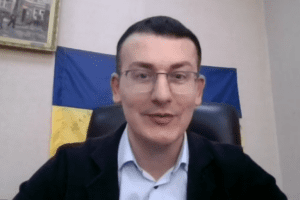 “We are holding our event on the eve of the third sad anniversary since the beginning of russia’s full-scale invasion of Ukraine. We are now trying to sum up some results and draw conclusions about the resilience of Ukrainian media about the resilience of journalists. The way journalists and media are transforming their activities, how they maintain their commitment to professional journalism, standards and their audience is already a phenomenon for the whole world,” said Sergiy Tomilenko, the President of the NUJU.
“We are holding our event on the eve of the third sad anniversary since the beginning of russia’s full-scale invasion of Ukraine. We are now trying to sum up some results and draw conclusions about the resilience of Ukrainian media about the resilience of journalists. The way journalists and media are transforming their activities, how they maintain their commitment to professional journalism, standards and their audience is already a phenomenon for the whole world,” said Sergiy Tomilenko, the President of the NUJU.
The conference covered a wide range of issues, from media transformation and international solidarity to the problems of journalists’ mental health and the specifics of covering war events for international audiences. Separate panels were dedicated to the work of women journalists on the front lines and challenges for regional media.
Ukrainian media at gunpoint: how war is changing the country’s information landscape
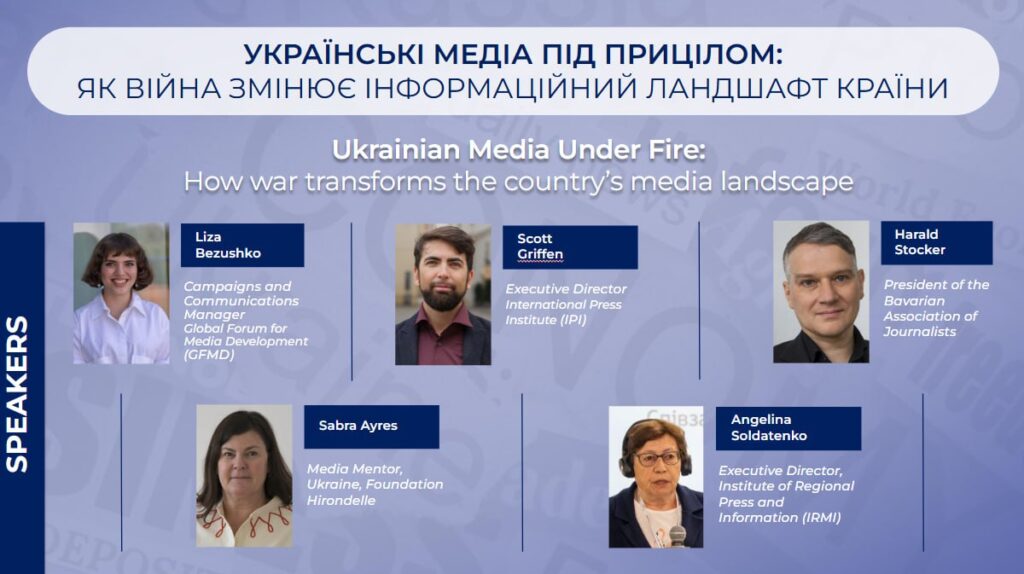
Liza Bezushko, a representative of the Global Forum for Media Development, emphasized the critical situation with media financing: “The termination of US financial support, which previously accounted for up to 80% of media development resources in Ukraine, has created a kind of existential crisis. Without urgent financial support, many media organizations are threatened with closure.”
Scott Griffen, the Executive Director of the International Press Institute, noted the resilience of Ukrainian media professionals and emphasized the importance of international support. “Ukrainian journalists are showing incredible resilience,” he said. “This is something that inspires not only people in your country but also journalists all over the world. And despite the fact that the situation is so difficult and dramatic, considering funding and other aspects, we believe and hope that this resilience will remain.”
Harald Stocker, the chairman of the Bavarian Journalists Association (BJV), emphasized the importance of print media in the context of the war in Ukraine: “If you have blackouts, the only thing you can read is print media. We have been raising funds to support these publications and will continue to do so.”
Sabra Ayres, an American journalist and mentor at the Fondation Hirondelle, emphasized the importance of local media for social cohesion: “Studies have shown that local media is what local communities trust. The role of local media is becoming even more important than ever before. And despite all these challenges that arise, I think that ultimately helping local media understand their role is one of the main goals that we set for ourselves for the development of the media.”
Anhelina Soldatenko, the executive director of the Institute for Regional Media and Information (IRMI, Ukraine), noted: “Assistance to Ukrainian media should not be just temporary support. It should be used effectively so that the media does not just survive, but emerge from this crisis stronger, more developed, armed with modern tools.”
Voices from Captivity: Stories of Journalists in russian Captivity
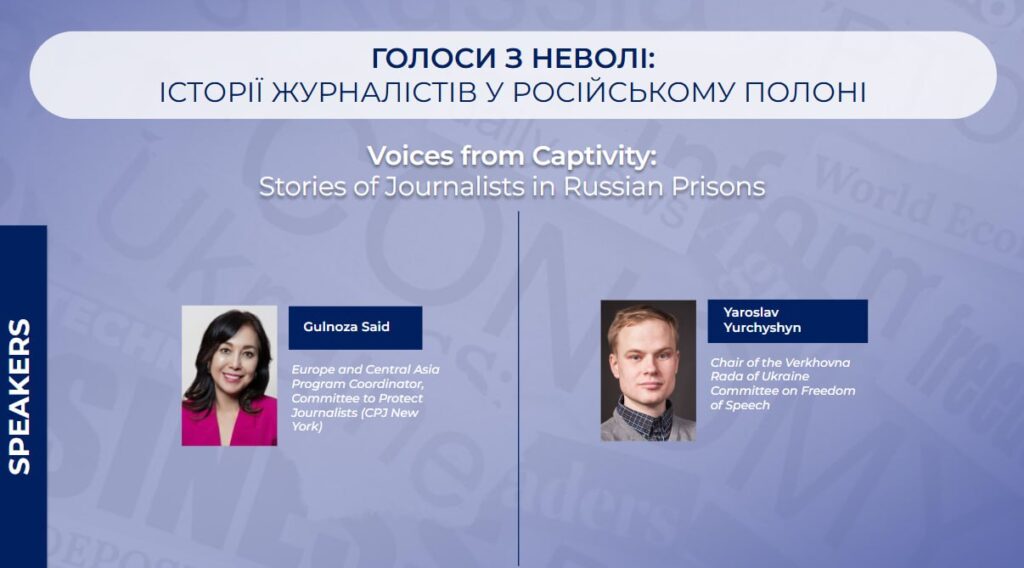
“We document russian crimes and advocate for the release of all Ukrainian journalists,” emphasized Gulnoza Said, the coordinator of programs for Europe and Central Asia of the US-based Committee to Protect Journalists (CPJ). “Unfortunately, the media is the first target of russian forces after they seize new territory in Ukraine. According to our data, the russian federation is among the five countries with the largest number of imprisoned journalists.”
Yaroslav Yurchyshyn, the Chairman of the Verkhovna Rada of Ukraine Committee on Freedom of Speech, noted that russian aggression against our state is a huge challenge in terms of freedom of speech and the work of the media. More than six hundred crimes against journalists have been recorded so far. “This includes the destruction of media outlets in the occupied territories, the murder of journalists, detention, and falsification of criminal proceedings against civilian journalists who, according to the Geneva Convention, as civilians, in principle should not be held hostage. According to the Ukrainian side, the Coordination Headquarters has verified about 30 civilian journalists who are in captivity. We are currently preparing hearings for the summer session of the OSCE Parliamentary Assembly, which will be dedicated to hostages, the situation of journalists during military operations, and Ukrainian hostage journalists in russia. We will appeal to the international community to disseminate information about them as widely as possible.”
Stories that change the world: how journalists shape global opinion about the russian-Ukrainian war
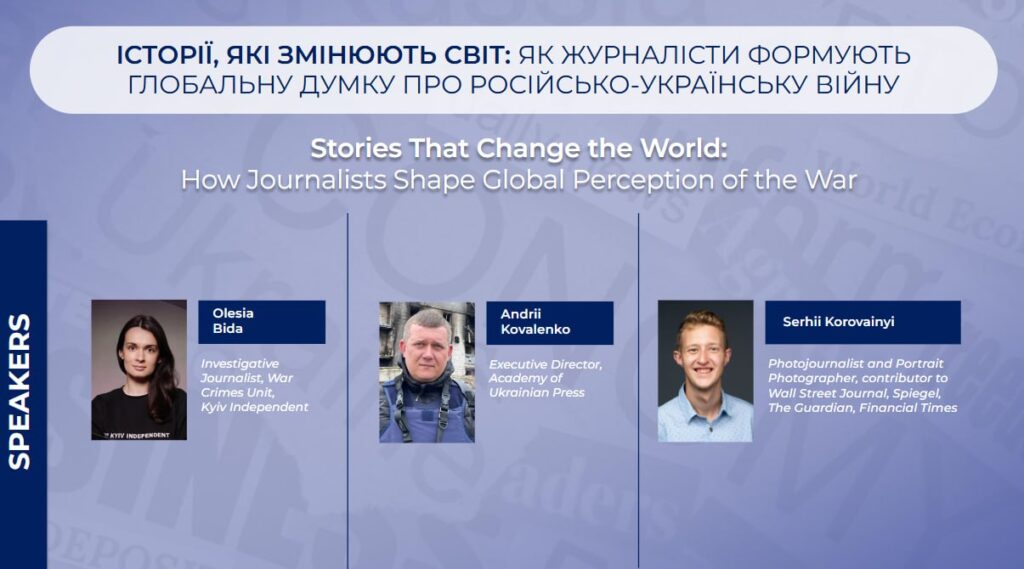
Olesia Bida, a journalist for Kyiv Independent, spoke about the work of the war crimes investigation department created two years ago: “During this time, we have published seven films. The most resonant was the investigation into the deportation of children. After the publication of this material, several children were returned. We also conducted investigations into sexual crimes… We are often the first to reveal to certain audiences what is happening in Ukraine.”
Andrii Kovalenko, executive director of the Academy of the Ukrainian Press, emphasized: “This war has never been documented in such detail in real-time in history. The truth is also a weapon, and today, we must defend it.”
Photojournalist Serhii Korovainyi shared his experience working for international media: “When filming news, some horrors, shelling, deaths, we lose this aspect – what kind of territory is this, why are we fighting for it, if it is purely a territory of grief? After all, people still live there – in Donetsk, Kherson, the front-line cities of the Zaporizhzhia Region, Kharkiv. And this is not all horror; these are also moments of joy. Moments that people abroad will be able to empathize with and understand us. Because this is the same life as theirs, but under the shadow of a great war.”
Women on the Front-line of Media: Challenges and Opportunities for Female Journalists
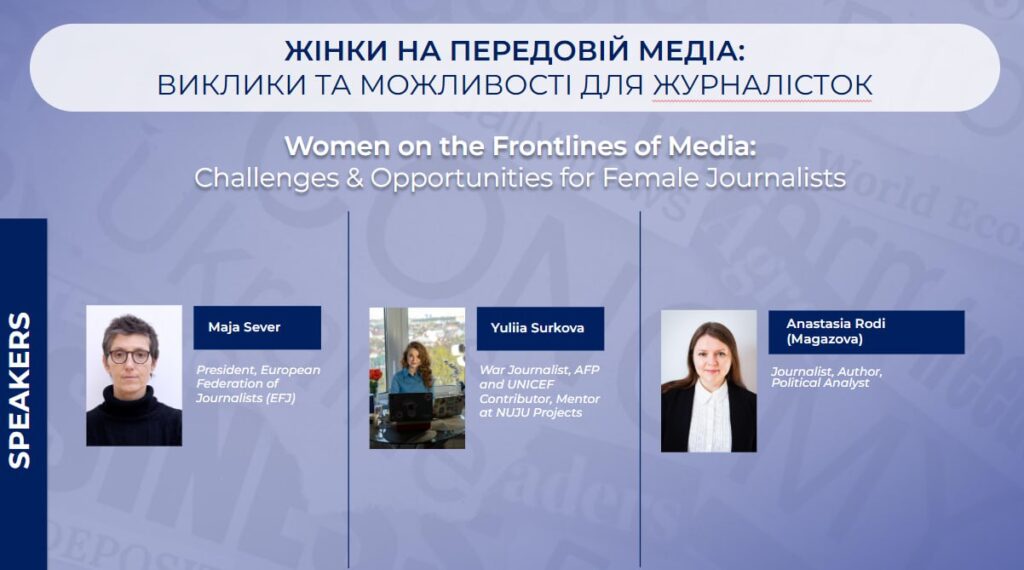
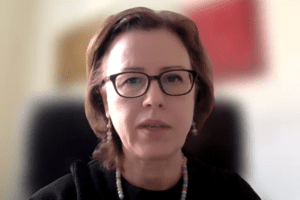 The First Secretary of the NUJU, Lina Kushch, who moderated the topic, noted that in Ukraine, the issues of female journalists are somewhat different from those of other European countries. “We have women in the majority in the Ukrainian media, and since the beginning of the large-scale invasion, this percentage has been growing. Women occupy more positions previously occupied by men in the media, including top positions. Women who often become war journalists – this is no longer surprising to anyone, and it is already completely familiar to our audience. However, this does not mean that female journalists in our country have the same level of protection and the same level of opportunities as male journalists.”
The First Secretary of the NUJU, Lina Kushch, who moderated the topic, noted that in Ukraine, the issues of female journalists are somewhat different from those of other European countries. “We have women in the majority in the Ukrainian media, and since the beginning of the large-scale invasion, this percentage has been growing. Women occupy more positions previously occupied by men in the media, including top positions. Women who often become war journalists – this is no longer surprising to anyone, and it is already completely familiar to our audience. However, this does not mean that female journalists in our country have the same level of protection and the same level of opportunities as male journalists.”
Speaking about the importance of women in war journalism, the President of the European Federation of Journalists, Maja Sever, emphasized that a female perspective “creates a deeper understanding of how people suffer and, in general, conflicts.” She emphasized that men are also excellent war journalists, but women’s contribution to war reporting “is sometimes more focused on humanitarian aspects.” Maja Sever shared her own experience as a war journalist during the war in Croatia. She spoke about the support of her Ukrainian colleagues. “I am still amazed by the resilience that you, as journalists and Ukrainians, have shown,” she said. “This is an inspiration, and this is what we need to learn. The European Federation of Journalists is trying to support and help.”
Yuliya Surkova, a war journalist, said that the war had become a personal matter for all Ukrainians, including media workers. “There is no division into work and personal because the war filled the entire space of your life. The Great War changed the priority for me from impartiality to empathy,” Yuliya said.
Anastasia Rodi (Magazova), a journalist for German media, shared the challenges of working for a foreign audience: “Being Ukrainian, an independent author, and working for an audience that is prone to different narratives is an additional challenge. Often, these are not the narratives that we would like to see in support of Ukraine.”
Mental health of journalists: how to maintain balance in times of war
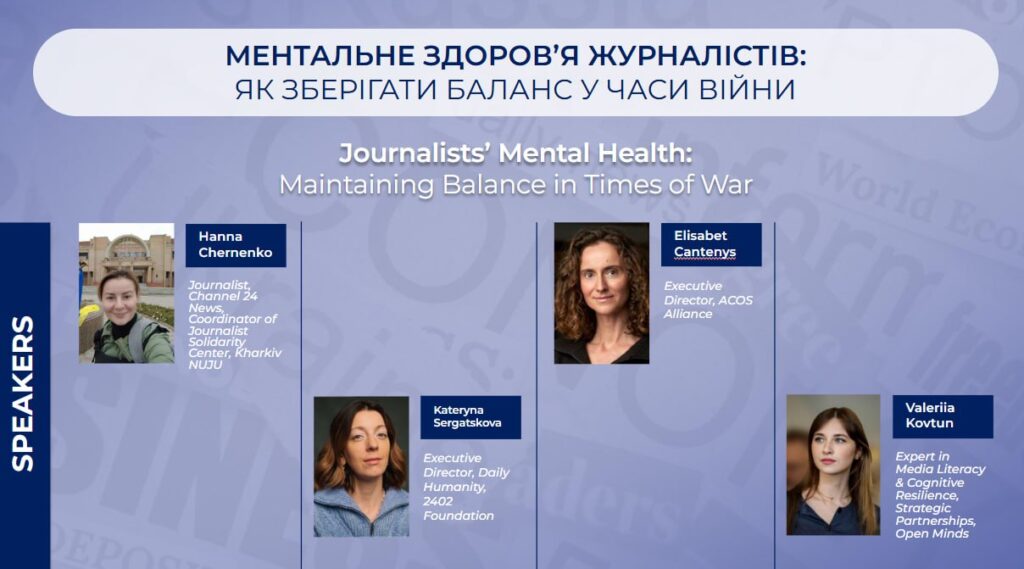
Kateryna Serhatskova, the executive director of the 2402 Foundation, presented the results of the research: “90% of media workers in Ukraine are either burned out or burn out regularly. And also, up to 90% of journalists say that they have experienced trauma, a traumatic event.”
In turn, Hanna Chernenko, the head of the Kharkiv Journalists’ Solidarity Center, drew attention to the problem of professional burnout among journalists covering the war: “No matter what harmony we once talked about, internal, emotional, which we try to maintain, this balance is lost. Every journalist who works or comes to work in the front-line area had days when he worked without stopping. Both during the day and at night… But at the same time, there are days of calm. And you hesitate between the fact that you are working too much and the fact that it seems that you are not working enough. And the brain processes this into the fact that it seems that you are “not doing anything important right now…”
Elisabet Cantenys, executive director of the ACOS Alliance, which is concerned with improving the safety of journalists around the world, emphasized the importance of psychological safety: “We cannot consider safety without a psychological component because the psychological component must be everywhere.”
Valeriya Kovtun, an expert on media literacy, emphasized: “The topic of mental health is in very high demand. Both among audiences and among media professionals.” Unfortunately, the enemy sometimes takes advantage of this. “Because many Ukrainians feel psychological pressure, they try to find at least some level of control and find it, as a rule, on astrology sites, various predictions. And these are exactly the platforms where russian propaganda very often secretly finds its audience… Specially selected “astrologers” sew various geopolitical messages between predictions.”
* * *
At the end of the conference, media expert Serhii Cherniavskyi presented an analysis of the situation with print media: “As of January 1, 2024, almost 1,200 names were published in Ukraine, and a little over 3,200 were registered. Currently, less than a thousand titles are published, not counting publications of higher educational institutions. At the same time, over 3,700 print media are registered. This is the largest number of subjects in the media sector that exists in Ukraine. There is not a single daily newspaper in Ukraine.” The expert emphasized that the reasons for the closure of newspapers are not only the war, but also the ill-considered activities of the postal operator – Ukrposhta.
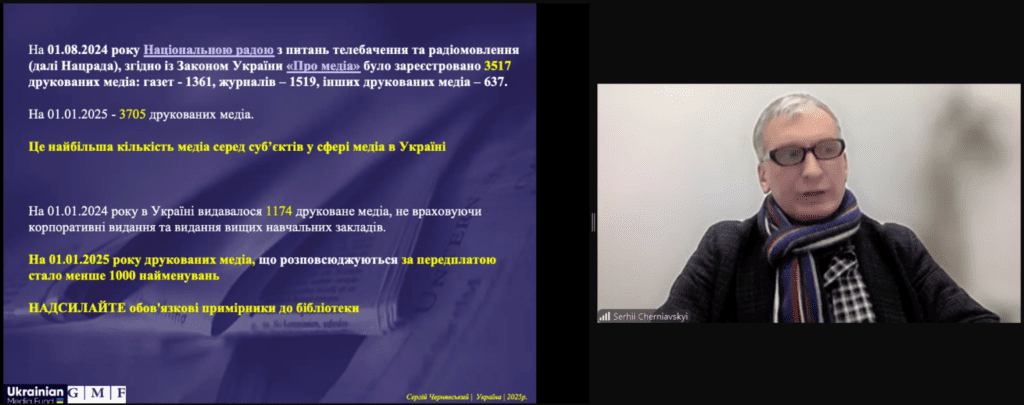
Following the event, a resolution will be prepared with recommendations on supporting Ukrainian media, which will include proposals for ensuring the mental health of journalists, supporting local media, and implementing long-term programs to assist Ukrainian media. The document is planned to be published on the eve of the third anniversary of russia’s full-scale invasion of Ukraine.
NUJU Information Service

 THE NATIONAL UNION OF
JOURNALISTS OF UKRAINE
THE NATIONAL UNION OF
JOURNALISTS OF UKRAINE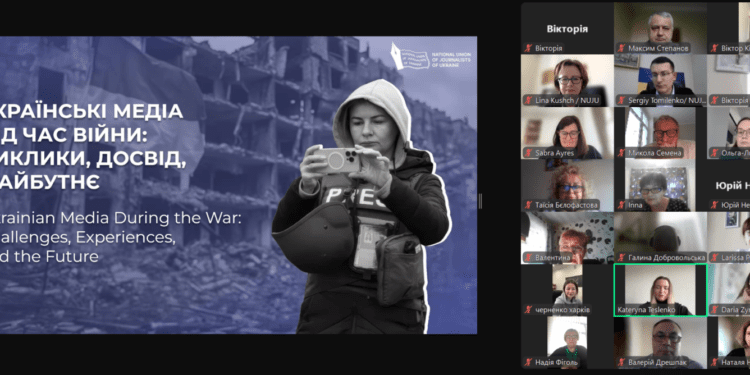
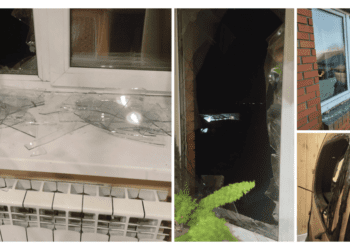
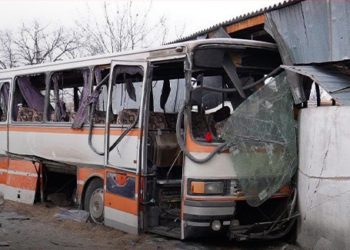
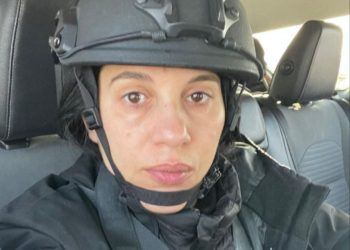













Discussion about this post